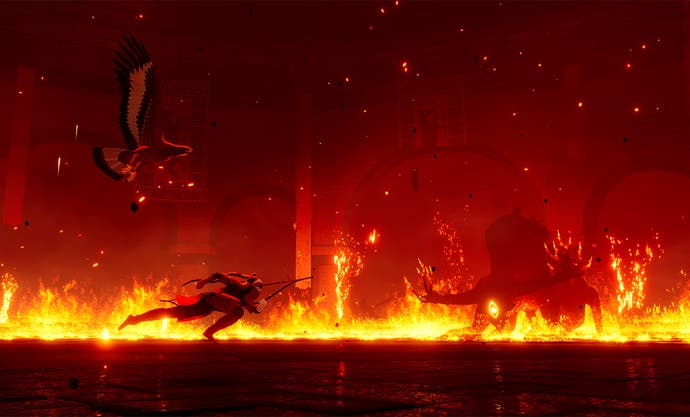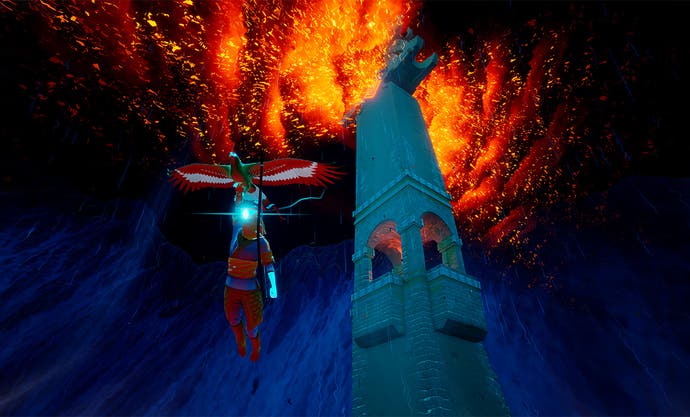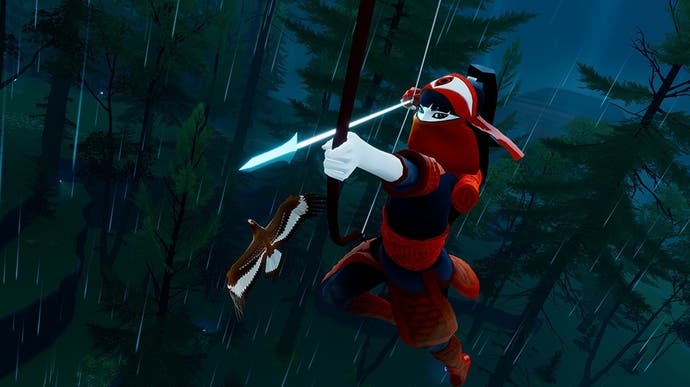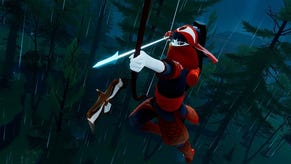The Pathless review - speed and scale and a game with an odd kind of charm
Eagle vision.
It's the sheer size of The Pathless that I love. And I mean size in a very specific sense. You can race through this whole adventure and be done in four hours, probably less. But when you're on the ground or in the air the game often feels endless: clear and spacious, slopes and contours and steppes in every direction. Such echoing realms of grass and rock. Such volumes of cold air. It's thrilling.
Yesterday I climbed a blasted cliff of ice and ancient stone to find a small temple at the top, built along a narrow ridge. I went inside and did some video game stuff, but mainly I just enjoyed the fact of where I was, the roof of the world, the wind billowing through tiled windows and the place I'd come from a dizzying sprawl far below me. I would have wandered up here for no reason at all. It was great. And when I emerged again, the red storm that stalks you across these huge maps was waiting right outside, right below me, a boiling angry Jupiter, threads of toxic cloud churning within it. A bright scarlet blot on a cold blue landscape. And inside? You know, the Pathless is alright.
It's simple stuff at heart. The world is in danger and the ancient gods have fallen. Haven't they always? You play a lone archer in this vast wilderness tasked with putting things back together again. You have to purify a bunch of corrupted guardians who take the form of mega-animals, and then tackle the baddy who's behind all this, travelling upwards from one huge stretch of land to the next as you go. Standard video game fare, but The Pathless manages to be sparse and winningly odd all the same.
Movement lies at the heart of it. I have never played a game quite like it. Scattered around the world are little diamond shapes hovering in the air. They're targets for your bow. Lock-on is generous to the point at which it becomes clear that this is not a game about aiming. You squeeze the right trigger to select a target and a square around it starts to turn from white to red. When it's all red - less than a second - you can release and hit the target. In truth, when it's half-red you can release and hit the target. Skill shot!
This stuff takes time to write down and explain, but in the game it is instantaneous - fleeting yet easy to parse, no gap needed for understanding. More: hitting the target gives you boost juice that allows you to run, which you do with the left trigger. So basically you're a kind of heat engine, taking energy in with the right trigger and transferring it to the left trigger where it turns into speed. I've made it sound complicated again. I also don't really understand heat engines, so the analogy was one big mistake. Anyway, that's the rhythm of the game, aim, fire, boost. Right to left.
The thing is, you do this at speed, as you're already boosting, rushing over the landscape, the grass a wet blur beneath you, the lines of the earth becoming ramps and channels. This is the Pathless. This is why the landscapes are so big, and why there's no fast travel and no pause menu map to help orient you. Instead you have a special mask you can wear that stains the world blue and makes your objectives glow red. Pick your own route and run! The world is your luge track, twisting and swooping through canyon and forest. Shoot and run!
And fly. Alongside the bow you also have an eagle, who can hold you aloft when you jump, and can be upgraded by collecting gems, to flap its wings taking you higher. Upgrading the eagle's flapping wings until you can boost yourself high into the sky is a key appeal here: an upgrade that really means something. When you're in the air you can still target diamonds on the ground and hovering in the sky, and you can still move at speed. The landscape breaks obligingly into steppes at times, so a game about running is also a game about climbing.
So yes, for the most part, movement is where it is at in The Pathless. And it's all justified by some pleasant saving-the-world stuff to do. In each level, you tackle the goddish mega-animal who's stalking you. You do this by triggering three towers, which each need to be filled with special stones. The stones you collect at other sites, often tumbledown temples or mazes, or once, very memorably, the top of a giant tree. These require very simple puzzles to unlock.
Say you need to fire an arrow through a flame to light a burner, but the only flame is some distance away. What do you do? You work your way around, coaxing the flame from one unlit torch to the next. It can feel a bit like pulling off trick shots in Snooker.

Or maybe there are hoops you need to fire arrows through, but the hoops are out of alignment. You can send the eagle out to move them into position or weight down switches and rotate mirrors. Always arrows and trick shots and a range of clever elements to consider. These are puzzles, and there is a sense of escalation, but for the most part they remain so light and pleasant they just feel like something nice to be doing to break up the movement.
Spend too long on the puzzles, though, and the roving red storm on the map may find you. Once inside the air blazes red and the trees are on fire. Your eagle crashlands in the grass and you need to hunt for it, while avoiding the gaze of the level's resident mega-animal. Punishment for failure is the loss of a few eagle-upgrade gems. Again, it's not too much to worry about. It's there to break things up, as is the business of petting your eagle to calm it after it's taken a toasting, as are the frequent landscape features with their own mini puzzles that reward you with more upgrade gems.
Once the towers are lit you head back into the red storm, and this, unexpectedly, will stay with me as one of the great moments of this generation, I think. You dive into the clouds, down into the belly of the hot Jupiter, through crackling electricity and past burning trees. The sense of heat, of sparks carried on scorched air, is really astonishing. Suddenly, the mega-animal is before you, a giant thing, a bear, a lizard, a dragon with multiple heads. It's picked out in flames, as ever, but now it's running from you, at speed, but with a slowed gait, as if navigating the thick, mineral air of a dream. Eyes appear alongside its body and you shoot them. It throws rocks and lava at you and you stay on course and shoot the eyes one by one until you trigger a multi-stage boss fight, a decadent bit of theatre, really, because The Pathless is absolutely uninterested in punishment. What it's interested in is imagination and choreography, attack waves that change not to wrong-foot you so much as to build to a climax before this beast is purified and you go onto the next map, riding a tornado into the sky, where the whole thing repeats.

It's a lot, but it's also a little. The Pathless is filled with things to do, but to enjoy it you really have to be able to enjoy the spaces in between. The twang and skew of your arrows that you barely have to aim, the rush of grass beneath you, the light through the trees, the sawing and yearning of Austin Wintory's slightly over-powering soundtrack, this last element a little too eager to bully you into feeling a certain way, suggesting a lack of trust in the game, perhaps, an unwillingness to believe that the other elements in play will take you somewhere special by themselves.
Ultimately, I am left with that rushing sensation, knees, forward, body leaning back, firing off another arrow at speed, an arrow that will only make me move faster. And now I think of it there are two other things besides this sensation that I can't get out of my mind.
The first - and it is always unwise to guess at this kind of thing - is that I suspect The Pathless did not have an easy journey onto the screen. I don't know why precisely, but there's something about the basic movement system, the auto-aim and those scatterings of diamonds all over the place that suggests to me that this game was bodged together, happily finding its harmony through a scrappy development. I may be very wrong about this. I may be very wrong that such an approach is not the norm. If anything, though, the sense of a team groping towards something odd that nonetheless works makes me like the whole thing even more.
The second is that landscape. I was playing last night, rushing through the basin of the first or second level again, and I suddenly realised that it reminded me of the landscape of the duvet, when you're playing with your toys as a kid, your bed standing in for rumpled deserts or snowbanks or vast plains. Good stuff comes from this. Robert Louis Stevenson used to play with his stepson's soldiers when he was sick in bed, an act that seems impossible to disentangle from his rangy, childlike, often febrile imagination. The Pathless is a little chillier than that - there are clear reminders throughout that key people from the team that made this also made stuff like Journey, with its cold poise - but it retains something of that dream of play. Speed and imagination and great beasts burning in the trees. I had fun.




